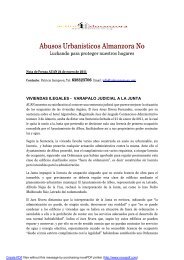European Property Rights and Wrongs - Diana Wallis MEP
European Property Rights and Wrongs - Diana Wallis MEP
European Property Rights and Wrongs - Diana Wallis MEP
You also want an ePaper? Increase the reach of your titles
YUMPU automatically turns print PDFs into web optimized ePapers that Google loves.
which the l<strong>and</strong> is sited, that is for the regional governments in Spain. However,<br />
public authorities must observe the human rights of citizens, including the right<br />
to property <strong>and</strong> the right to respect for a home. Human rights are in play when a<br />
public authority affects the l<strong>and</strong> of a citizen (a vertical application) but not when<br />
one citizen sues another (a horizontal application). In the Spanish cases one apprehends<br />
that the state is involved albeit indirectly by enacting the legislation<br />
which is being used by developers against owners (indirectly horizontal applications,<br />
like James v United Kingdom (application 8793/79, February 21st 1986).<br />
So the Valencian legislation might potentially be challenged in the human rights<br />
court in Strasbourg, though only after domestic Spanish proceedings based on<br />
Spanish <strong>and</strong> regional constitutions had been unsuccessful.<br />
In order to bring human rights into play it is necessary to establish an interference<br />
with a convention right that was unjustified. The first stage is relatively easy,<br />
but it is important to classify the potential infringement. The right to property is<br />
conferred by article 1 of Protocol 1. Most commonly l<strong>and</strong> use legislation will constitute<br />
a control on the use of l<strong>and</strong>, in which case it will be subject to the principle<br />
that the state is not (at least usually) required to pay compensation for the imposition<br />
of a control on the use of l<strong>and</strong>. So a planning refusal may cost the owner a<br />
great deal of money, but no human rights issue arises if the decision is lawful <strong>and</strong><br />
justified in pursuit of a legitimate public interest <strong>and</strong> is reached after following<br />
a proper procedure. So too with a decision to impose infrastructure costs on an<br />
owner or a decision to demolish an illegal construction; it is the same as a British<br />
local authority deciding to make up a private road <strong>and</strong> charging the cost to the<br />
frontagers. That is the basic position.<br />
A number of chinks can be seen in this shield. Some decisions in Spain might<br />
be classified as deprivations – either as a formal compulsory purchase or a de<br />
facto deprivation of property having the same effect. If a case is recategorised as<br />
a deprivation the normal requirement is that the public authority should pay the<br />
market value of the interest taken. Complaints that inadequate compensation has<br />
been offered might fall into this category, <strong>and</strong> other arguable issues are decisions<br />
which effect a de facto deprivation without a proper procedure being followed,<br />
procedural impropriety, delay, <strong>and</strong> the lack of an opportunity to challenge the decision<br />
making process. Human rights challenges are often based on a discriminatory<br />
interference (article 14) with a right to property (Protocol 1 article 1). This is possible<br />
where analogous cases are treated differently or different cases are treated the<br />
51



